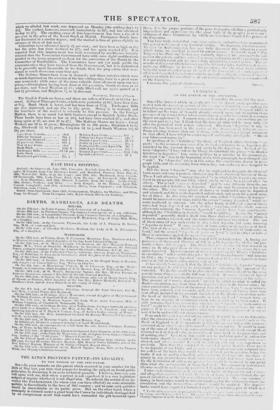THE KING ' S PRINTER ' S PATENT—ITS LEGALITY. To Tim EDLTOR OF THE
SPECTATOR.
S1R-411 yodr remarks on this patent which occurred in your number for the 30th of 3lay last, you state that you prefer treating the subject on broad public principles, to discussing it on mere technical grounds. I believe, however, you will agree with me, that when a patent is not expedient, it is a very legitimate subject of inquiry whether it is not illegid also. To subvert the reward of an in- ventor like FounnumEn (to whose case you have alluded) on some miserable quibble, is discreditable to t laws of this country ; and to raise such quibbles would be discreditable to its public press. Butt on the other hand, where a monopoly is claimed under a ;punt from the Crown by individuals distinguished by. no conspicuous merit that could have warranted the gift bestowed upon them, it the proper :.s ace of the i to inquire whether a grant clearly
iinprovident anti oppre. -.ve (to the re.1 t bulk of lhe people) is or is nut a violation of those restrictions IT which our laws have hounded the powers of the Executive.
You have truly st:-.te.1 that Some very eminent authorities have protimmeed patent to lie one of v,•ry doubtful validity. Mr. GODSON, a barrister, now 11.1.•••..9er for Kidder:1)1;i- se:•, leas very fully disesissed this subject in a work ss 1.4.11 tiwins an excellent vo • •• for patent aganit..t. 1-nder the head " The Ising- met Ids Print-..rs,- can:11.11y halanc.al tie- urgninents for and
' • • :;.. 'oelination to 1 ". .. conclusion that
it is one atleIt cou.,1 slot 1.,, '....1..,1 1•1 v.•. The re-
newals of ibis 111 . it SCCIO4, make any • ..1 t.1ItValidity being the Want all, it is 011V1011S that ::...• (lit.I ! . hara: :
ot' powers which the con,,tilitti...1 of Tit- 1; r "1101I'le CUTICCITC11. On The ENCCIIIIVO. , -a- the patent, -ant ,


























 Previous page
Previous page